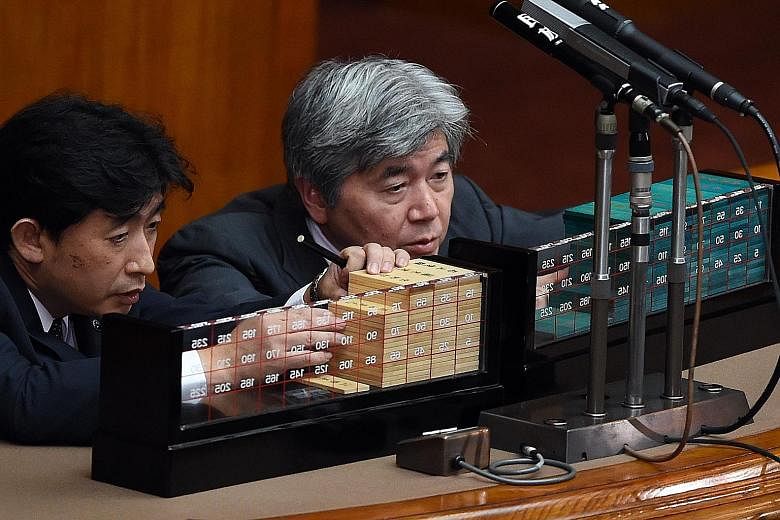TOKYO • Japan was on the verge of passing Bills yesterday that will allow troops to fight on foreign soil for the first time since World War II, despite fierce criticism that it will reshape the proudly pacifist nation.
Prime Minister Shinzo Abe's ruling coalition wants to vote the controversial Bills into law after days of heated debate that at times descended into scuffles, tears and tantrums.
Hundreds gathered in front of the Parliament building in Tokyo yesterday in a last-ditch rally against the laws, which could see the biggest shift in Japan's defence policy for half a century.
Tens of thousands of people, young and old, have taken to the streets for weeks in almost daily rallies, in a show of public anger on a scale rarely seen in Japan.
"The Bills are against the Constitution. It's a legislation that doesn't respect people's lives," said Mr Hozumi Wada, 70, who said he was protesting for the first time since he was a student.
"I wanted to do everything I can," he said, holding up a placard that read: "No war".
Nationalist Mr Abe wants what he calls a normalisation of Japan's military posture, which has been restricted to narrowly defined self-defence and aid missions by a pacifist Constitution imposed by the United States after World War II.
He and his backers say the changes are necessary because of threats from an increasingly belligerent China and unstable North Korea.
Opponents argue that the new laws - which would allow the tightly restricted military to fight in defence of allies - go against the national psyche and could see the country dragged into American wars in far-flung parts of the globe.
Tempers flared in Japan's Parliament on Thursday, and chaos broke out as opposition politicians physically tried to block a committee approving the Bills.
Although they failed, opposition members continued their delaying tactics yesterday in a bid to push approval of the Bills back until after a long weekend.
One lawmaker dressed in black and carried Buddhist beads, in a mock funeral procession, as he cast a vote in support of an Upper House censure motion against Mr Abe.
The Bills were still expected to pass yesterday, as the ruling coalition holds a majority in both houses of Parliament. Mr Abe has faced fierce criticism for both the laws themselves and the way he has driven them through in the face of public opposition.
There are growing signs that this is taking a political toll - opinion polls show the vast majority of Japanese are against the changes, and Mr Abe's once sky-high approval rating is dropping.
Unable to muster support to amend clauses enshrining pacifism, Mr Abe opted instead to re-interpret the document for the purpose of his Bills, ignoring warnings from scholars and lawyers that they are unconstitutional.
Opponents, including a Nobel Prize winner, popular musicians and other prominent figures, say the changes could fundamentally alter Japan.
But Chief Cabinet Secretary Yoshihide Suga said the wrangling should end, blaming the opposition for wrongly labelling the legislation "war Bills". "We have spent enough time and had enough debate," he told reporters yesterday.
Washington backed the changes, but regional rivals China and South Korea expressed concern at any expansion of Japanese military might.
Chinese Foreign Ministry spokesman Hong Lei yesterday called on Japan to "listen carefully to voices inside and outside the country calling for justice", and called on lawmakers to "take real actions to protect regional peace and stability".
Security experts say the Bills will force a re-evaluation of Japan's place on the world stage.
"The Bills are a psychological message to the world that an era in which Japan should not be involved in conflicts because of its exclusively defence-oriented policy is over," said Professor Hideshi Takesada of Takushoku University in Tokyo.
AGENCE FRANCE-PRESSE

